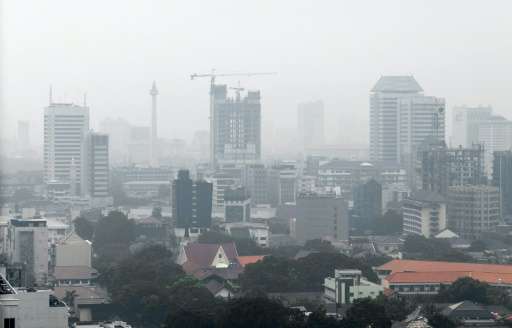Haze caused by vehicle emissions hangs over Jakarta's skyline
Indonesia, one of the world's biggest greenhouse gas emitters, Wednesday ratified a landmark climate rescue pact but environmentalists expressed scepticism about the government's plans to limit global warming.
The country's parliament agreed to endorse the Paris Agreement which was reached last December in the French capital, joining scores of other countries which have ratified the deal.
It requires all countries to devise plans to achieve the goal of keeping the rise in temperatures within two degrees Celsius (3.6 degrees Fahrenheit) above pre-industrial levels.
The accord is due to enter into force on November 4, earlier than expected, after the threshold for ratification—by 55 countries responsible for 55 percent of emissions—was reached earlier this month.
In its plan Indonesia pledged to cut emissions by at least 29 percent by 2030 by stepping up protection of forests and expanding the renewable energy sector.
The sprawling archipelago is home to vast tracts of tropical rain forest. But much has been felled in recent years, to be sold as timber and to make way for palm oil and pulp plantations, greatly increasing the country's emissions.
Indonesia also says that if it receives international aid such as financing, it will raise its target to a 41-percent cut by 2030.
Green groups have criticised the pledge as lacking in detail, such as ways to tackle forest fires that burn out of control in Indonesia every year, cloaking the region in toxic haze.
Last year's fires were the worst for years. A study by environmental watchdog the World Resources Institute estimated that at their peak, the blazes led to Indonesia spewing more greenhouse gases into the atmosphere each day than all US economic activity.
The institute usually classifies Indonesia as the fifth biggest emitter of greenhouse gases.
Hindun Mulaika, who works on climate change with Greenpeace Indonesia, said that the "devil is in the detail" when it came to the official plans.
"There are still ongoing projects that are really carbon-intensive," she said, noting the government was in the process of building a series of new coal-fired power plants.
© 2016 AFP
























